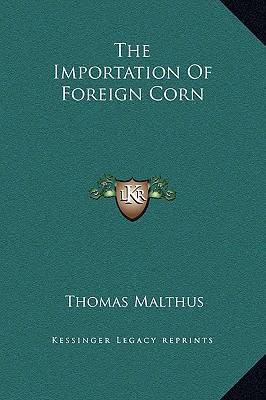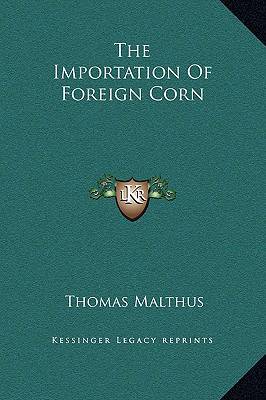
- Afhalen na 1 uur in een winkel met voorraad
- Gratis thuislevering in België vanaf € 30
- Ruim aanbod met 7 miljoen producten
- Afhalen na 1 uur in een winkel met voorraad
- Gratis thuislevering in België vanaf € 30
- Ruim aanbod met 7 miljoen producten
Zoeken
Omschrijving
The Importation of Foreign Corn by Thomas Malthus is a book that explores the economic and political implications of importing foreign corn into England during the early 19th century. Malthus argues that the importation of foreign corn could lead to a decline in domestic agriculture and a loss of national sovereignty. He also suggests that the importation of foreign corn could lead to a decline in the quality of life for the working class as it would result in lower wages and increased unemployment. Through his analysis, Malthus provides a critical examination of the economic policies of his time and offers insights into the challenges facing modern-day economies. The book is a valuable resource for anyone interested in the history of economic thought or the political economy of trade and agriculture.From the vicinity of France, and the cheapness of its corn in all years of common abundance, it is scarcely possible that our main imports should not come from that quarter as long as our ports are open to receive them. In this first year of open trade, our imports have been such, as to shew, that though the corn of the Baltic cannot seriously depress our prices in an unfavourable season at home, the corn of France may make it fall below a growing price, under the pressure of one of the worst crops that has been known for a long series of years.This scarce antiquarian book is a facsimile reprint of the old original and may contain some imperfections such as library marks and notations. Because we believe this work is culturally important, we have made it available as part of our commitment for protecting, preserving, and promoting the world's literature in affordable, high quality, modern editions, that are true to their original work.
Specificaties
Betrokkenen
- Auteur(s):
- Uitgeverij:
Inhoud
- Aantal bladzijden:
- 30
- Taal:
- Engels
Eigenschappen
- Productcode (EAN):
- 9781169181342
- Verschijningsdatum:
- 10/09/2010
- Uitvoering:
- Hardcover
- Formaat:
- Genaaid
- Afmetingen:
- 178 mm x 254 mm
- Gewicht:
- 276 g

Alleen bij Standaard Boekhandel
+ 89 punten op je klantenkaart van Standaard Boekhandel
Beoordelingen
We publiceren alleen reviews die voldoen aan de voorwaarden voor reviews. Bekijk onze voorwaarden voor reviews.











